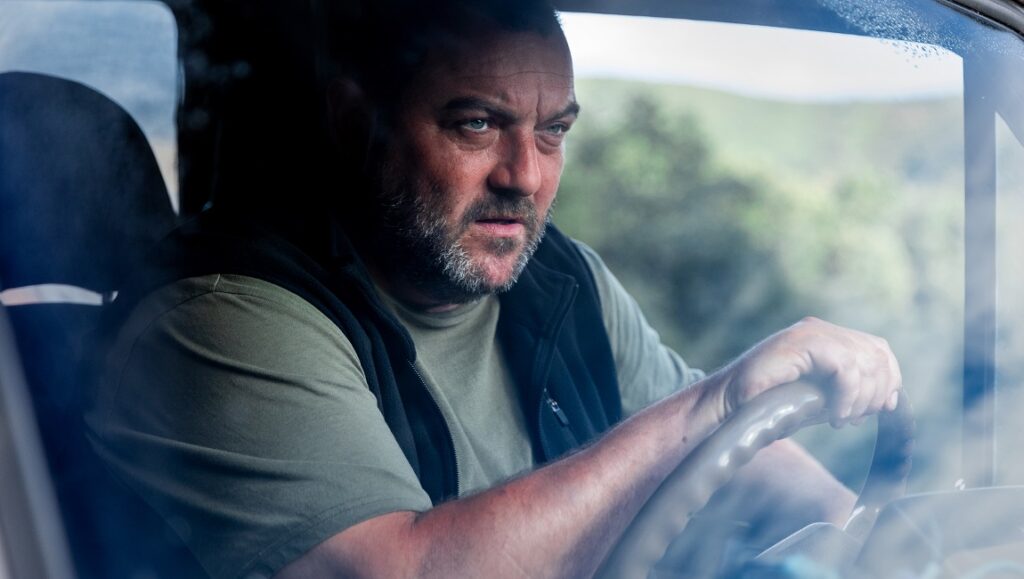When talking about Mouchette, his acclaimed 1967 drama, Robert Bresson said that the put-upon titular character “offers evidence of misery and cruelty. She is found everywhere: wars, concentration camps, tortures, assassinations.” The study of human nature — if there even is such a thing — has long proven itself to be fertile ground for countless cineastes attempting to come to terms with our capacity for seemingly boundless pettiness, hate, and cruelty. It’s revealing that the descriptor “character study” isn’t usually associated with comedies. To explore human nature, it seems, is to come face to face with its wickedness.
Rodrigo Sorogoyen’s thriller The Beasts is no different. Set in rural Galicia, the film — inspired by true events, incidentally — follows French farmers Antoine (Denis Ménochet) and Olga Denis (Marina Foïs) who have settled in the Spanish countryside, growing and selling eco-friendly produce. Their adopted home seems idyllic, but tensions have materialized ever since a wind energy company offered to buy land for a turbine project. Most of the village, tired of the backbreaking work and crushing poverty, favor the sale, while the French expatriates oppose it, supposedly out of concern for the environment. Two villagers are particularly unhappy about the Denises’ resistance, Xan (Luis Zahera) and Lorenzo Anta (Diego Anido), brothers who work and live on the neighboring farm and who go out of their way to let Antoine feel unwelcome.
What starts out with mild provocations — the commanding, sinister Xan has a habit of calling Antoine “Frenchy,” for instance — soon escalates into open hostility, and when Antoine finds empty liqueur bottles in front of his house and his garden chairs soaked in urine, he comes to believe that the brothers will stop at nothing to drive him and his wife out of the village. Of course, the Guardia Civil is no help, insisting that the warring parties simply hash things out over drinks. When Antoine and Olga find their tomato harvest poisoned by car batteries thrown in their farm’s well, however, the conflict reaches a point of no return.
From the start, Sorogoyen’s film seems predestined to devolve into tragedy. For one, the narrative conventions of a thriller obviously invite (and in some cases require) a certain violent dimension, and for another, the Spanish director does his best to infuse the beautiful setting with an air of quiet menace and desperation. Both the rural setting and a good deal of the character dynamics recall Sam Peckinpah’s Straw Dogs, although Sorogoyen doesn’t stoop to Peckinpah’s misogynist sexual politics — or sexual politics of any kind for that matter. At one point, Xan makes reference to wanting “a woman like [Antoine’s],” hinting at some degree of sexual frustration and envy, but, for reasons that aren’t exactly clear, Olga largely escapes the wrath of the unhinged sibling duo.
Sorogoyen’s interests seem to be more sociological than psychological. The Beasts lays out its central dispute along the lines of the urban–rural divide, with the Denises representing the educated, ecologically conscious city slickers who see rural life mainly as a domain for self-actualization and establishing a connection with nature, while the brutish, libidinal Anta brothers embody the long-suffering demographics left behind by neoliberalism, toiling away in poverty with little hope for genuine change. The film emphasizes and builds a lot of its tension from the gap in formal education in particular: when the portly Antoine (not exactly the wimpy poindexter that Dustin Hoffman’s David Sumner is in Straw Dogs) remarks upon Xan’s lack of “studies,” Xan quickly shoots back, “Calling me an idiot?” Lorenzo, meanwhile, literally has a diminished mental capacity stemming from an injury he sustained in childhood.
But what exactly is the point? The antagonistic atmosphere — as well as Xan’s toxic charisma and overt dislike of his French neighbor — is established in the very first scene, and from there, the film works that tension through familiar genre tricks: unhelpful cops, worryingly nonchalant bystanders, male stubbornness, and unpredictably violent country folk all build towards an inevitable moment of violent (though not especially violent) release. It’s solid but unspectacular filmmaking and its issues — most glaringly, its lack of meaningful characterization — truly reveal themselves when, after the anticipated eruption of violence, the film decides to tack on a 45-minute coda focused on Foïs’ Olga. Here, it becomes apparent that Sorogoyen has played his hand prematurely.
Pauline Kael described Straw Dogs as “a machine headed for destruction” — where exactly The Beasts is headed isn’t as clear. Late in the story, Olga’s character becomes saddled with the stock emotional baggage thrust upon female characters by a spouse who, as it turns out, wasn’t quite the considerate, thoughtful man he presented himself as. This quasi-revelation might imply something about Antoine’s ostensibly enlightened brand of masculinity not being all that far removed from the id-driven machismo of his adversaries, but considering how that conflict plays out, whatever point it’s trying to make is rendered moot.
Plot contrivances (and Peckinpah’s intensely misanthropic worldview) forced David Sumner to renounce his limp pacifism and become a “real man” by embracing his inner beast. An ugly transformation, to be sure, but a decently interesting one at least. But in The Beasts, there is no such transformation. In fact, Sorogoyen never forces his protagonists to do much of anything. They grow irritated, they argue, they curse, they go to the police, rinse, repeat. The film works decently as long as it dwells in the realm of tension-building via not-so-passive aggression, but when it’s all said and done, it’s unclear what any of it — the central conflict, the Denises’ relationship, the violence, the opiating final act — is supposed to mean.
DIRECTOR: Rodrigo Sorogoyen; CAST: Denis Ménochet, Marina Foïs, Luis Zahera; DISTRIBUTOR: Greenwich Entertainment; IN THEATERS: July 28; RUNTIME: 2 hr. 18 min.


Comments are closed.